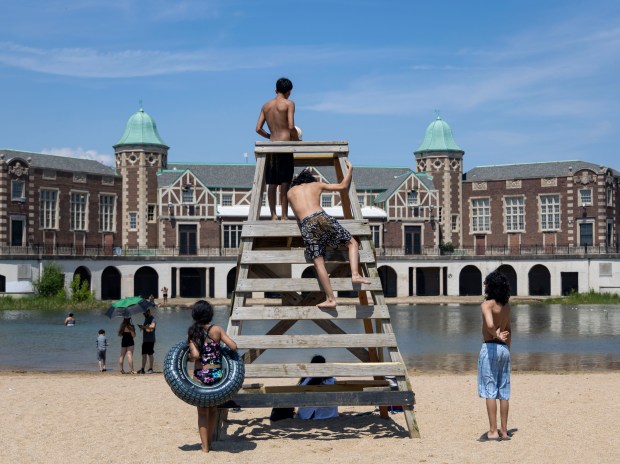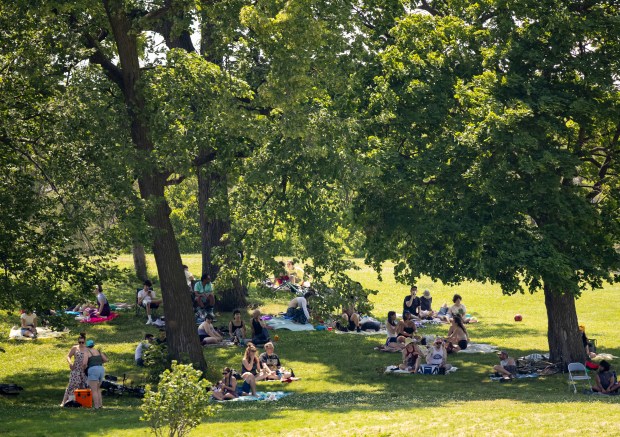A heatwave stretching from the Midwest to the Northeast is expected to linger for at least five days, and meteorologists warn that Chicago is one of a dozen large metropolitan areas expected to see temperatures camp in the low to mid-90s for the week.
An air quality alert was issued for Sunday and Monday because hot weather can increase levels of pollutants in the atmosphere. The Illinois Environmental Protection Agency is urging Chicagoans to limit prolonged outdoor activities due to levels of ozone that are unhealthy for sensitive groups, including children and people with pulmonary or respiratory disease.
Last summer, Chicago and other parts of the country were blanketed with smoke from wildfires in Canada, experiencing several stretches of poor air quality.
On average, Chicago experiences about four days of 90-degree temperatures in June every year. The city’s longest stretch of 90-degree weather for the month of June occurred seven decades ago — in 1954 — and lasted 11 days.
The Office of Emergency Management and Communications issued a statement Sunday warning residents about extreme heat and unpredictable weather, as a brief evening thunderstorm capped off the weekend.
Today will mark the beginning of a multi-day stretch of hot and muggy weather featuring heat indices that may near or even exceed 100 degrees at times. Periodic chances for isolated to scattered storms are also expected over the next few days, including today. #ilwx #inwx pic.twitter.com/TwQXnC2cWq
— NWS Chicago (@NWSChicago) June 16, 2024
“That’s gonna help push a lot of south and southwest winds into our area and lift in a much warmer and more humid air into the Chicago area, and even surrounding areas in northeastern Illinois and the surrounding Great Lakes,” said Zachary Yack, a meteorologist with the National Weather Service of Chicago.
“We’ll look at high temperatures to top out in the low to mid-90s throughout much of this upcoming week. And with those humidity values, that will probably push heat indices in that 95 to 105-degree temperature range.”
Heat indices combine atmospheric temperatures and relative humidity for a realistic measure of how humans experience the weather.
Recent dry weather could blend with the hot temperatures to create a rapid-onset drought across the eastern Corn Belt and Mid-Atlantic.
Hot, dry conditions can in turn lead to high concentrations of ground-level ozone, which is created when sunlight causes a reaction between two types of pollutants: organic chemical compounds from the manufacture of products like paint, pharmaceuticals and refrigerants, and nitrogen oxides from diesel and gasoline engines. Wildfires are also a contributor.
Different from the naturally occurring ozone layer that is higher up in the atmosphere, ground-level ozone can have adverse effects on human health and produce a burning feeling in the throat, airways and lungs, leading to swelling, shortness of breath, asthma attacks, coughing, chest pains and throat irritation. Symptoms include wheezing, coughing, a fast heartbeat and fatigue.
The areas under an air quality alert include Cook, DuPage, Kane, Kendall, Grundy, Lake, McHenry and Will counties. Even if the air quality forecast is unhealthy for sensitive groups, ozone is often lower in the morning when temperatures are cooler. People can check the current air quality in their location to schedule their active time outdoors at AirNow.gov.
“Everybody’s got their own thresholds … for medical reasons or even personal preference,” Yack said of the hot temperatures.
Considering the heat and unhealthy air quality experts say some should consider staying inside a cool or air-conditioned room. Those who have to be outside should practice heat safety by drinking water, taking breaks and not overexerting themselves.
Risks to swimmers
Satellite images showed Lake Michigan surface temperatures along the Chicago shore hovered around the low to mid-60s Sunday, according to the National Oceanic and Atmospheric Administration. While the hot weather can make the waters seem relatively balmy, beachgoers should remain mindful of swimming conditions.
On Saturday afternoon, a man reportedly fell from a boat on the lake’s “Playpen” area near Ohio Street Beach without resurfacing. After Chicago Fire Department rescue divers searched for an hour and a half, the operation was called off for the night, according to a spokesperson. It is now a recovery mission being handled by the Marine Unit of the Chicago Police Department. There were no updates as of Sunday afternoon.
Southern Lake Michigan beaches in Illinois and Indiana account for half of all drownings in the lake.
Beachgoers can access information on the flag color warning system at each beach or by visiting chicagoparkdistrict.com/beaches. A green flag indicates swimming is permitted, a yellow one urges caution and a red flag means a swim ban is in place due to unsafe swimming standards.
Beat the heat from the pool to the beach
City officials are urging residents to check on relatives, neighbors, seniors and other vulnerable people during periods of extreme heat, or to request a well-being check by calling 3-1-1. In case of a medical emergency due to heat, people should call 9-1-1.
If the weather service issues an extreme heat warning — which it does when the heat index reaches 105 to 110 degrees for two days in a row — or in case of severe storms or another emergency, the city will coordinate a response to assist residents and vulnerable populations.

The city’s Department of Family and Support Services will activate cooling centers at its six community service centers when the weather service issues a heat emergency. These centers are open Monday through Friday from 9 a.m. to 5 p.m.:
- Englewood Center at 1140 W. 79th St.
- Garfield Center at 10 S. Kedzie Ave.
- Dr. Martin Luther King Center at 4314 S. Cottage Grove Ave.
- North Area Center at 845 W. Wilson Ave.
- South Chicago Center at 8650 S. Commercial Ave.
- Trina Davila Center at 4312 W. North Ave.
For families and residents who need urgent help being placed in a shelter, the Garfield Community Service Center is open 24 hours, seven days a week.
Over 80 Chicago Public Library locations across the city have water fountains and can provide relief during their hours of operation, which can be found for local library branches at chipublib.org.
More than 240 Chicago Park District fieldhouses and over 200 water spray features and water playgrounds also allow Chicagoans to cool off. Find locations at chicagoparkdistrict.com/parks-facilities.
The 27 indoor and 50 outdoor public swimming pools operated by the park district will open just in time to alleviate the summer heat. Beginning Monday, all locations will offer a six-day schedule through Labor Day. Pool hours will primarily run from 11 a.m. to 7 p.m., and most locations will be open on the weekends.
“Our pools are vital and vibrant community assets that are bustling with community activity all summer long,” said Rosa Escareño, the district’s superintendent and CEO, in a news release Sunday. “We are happy to open all of Chicago’s pools, six days a week, for what is expected to be a very hot summer.”
Some pools may experience intermittent closures due to temporary maintenance repairs, and schedules might be adjusted as lifeguards return to school before Labor Day. Residents should check the schedules of their local park on the district’s website to find out specific hours of operation and for pool programs like family swim, senior swim, swim teams hours and summer day camp visits.
The Humboldt Park beach, the city’s only man-made inland beach, will also open Monday after a four-year hiatus. The other 22 lakefront beaches all opened May 24. All beaches will be staffed and open daily with free summer admission from 11 a.m. to 7 p.m. through Labor Day.
To receive the latest updates on heat advisories and weather emergencies, residents can register for emergency alert notifications at NotifyChicago.org or download the Chicago OEMC App.




